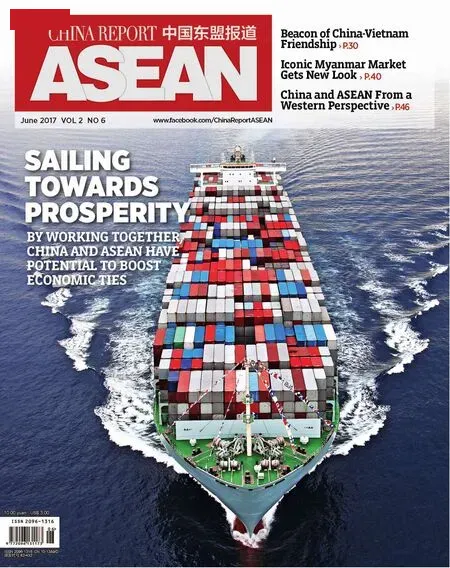Hopes and Expectations
By Wang Jiping
Hopes and Expectations
By Wang Jiping
From trade in seafood to fresh fruit, Maritime Silk Road countries look forward to further cooperation along the route

At the inauguration of the Indonesia Pavilion at the 19th Cross-Straits Fair for Economy and Trade, a traditional Indonesian dance performance was held.
The successful Belt and Road Forum for International Cooperation (BRF), which was held in May in Beijing, once again drew the world’s attention to China and made the construction of the “core area of the 21st Century Maritime Silk Road” a fresh talking point for countries along the route.
At the Cross-Straits Fair for Economy and Trade (CFET) 2017 recently held in Fuzhou, the capital of southern China’s Fujian Province, political figures and business leaders alike from countries such as Indonesia and Thailand exhibited full confidence in future cooperation with China under the framework of the Belt and Road Initiative. They also expressed hope to establish more dynamic partnerships with China and develop mutually beneficial sectors such as exchange in seafood and fruit. They hope to do this by taking advantage of the advanced ports, favorable climate and cultural environment of Fujian, as well as its neighboring Chinese provinces, so as to better facilitate “post-BRF cooperation”.
Regional Cooperation Expansion
Speaking on the BRF influence and future bilateral cooperation, Indonesian Ambassador to China Soegeng Rahardjo told China Report ASEAN that he believes the forum will propel further infrastructure and trade cooperation between the two countries. He also revealed that when attending the forum, Indonesian President Joko Widodo confirmed that China is an important partner of Indonesia, and that the implementation of the Belt and Road Initiative is certain to bring benefits to the economic development of his country.
“I specifically flew to Fujian to attend this year’s CFET, which is a testament to the importancewe have attached to conducting regional economic cooperation with China,” Rahardjo said. “We established an Indonesia Pavilion at the fair, and guests from both countries were in attendance for its inauguration. We can see the Chinese side’s sincerity to carry out cooperation with Belt and Road countries following the principles of extensive consultation, joint contribution and shared benefits.”
Fuzhou has strong historical and cultural connections with Indonesia, and the preferential policies provided by the China (Fujian) Pilot Free Trade Zone (Fujian FTZ) are highly attractive to foreign investors, Rahardjo explained.
“We hope to start with Fuzhou, and through the CFET, Indonesian enterprises of varying sizes will gain a clear and thorough understanding of the city’s economic and trade policies so they can make investment accordingly,” he added. “We are planning to set up a business center in Fuzhou as a bridge between firms on both sides, and will give full play to the role of the Center of Indonesian Studies at Fujian Normal University to enhance people-to-people connectivity.”
According to Huang Zhaoying, an international business manager at the Economic Development Department of the Fuzhou Area Administrative Committee of Fujian FTZ, Fuzhou is the first city in China to initiate a registration system that allows foreign-funded enterprises to obtain a business license by simply submitting application documents to a single counter at the Fujian FTZ service hall. They also printed brochures and pamphlets to educate foreign businesspeople about related policies.
Focusing on Key Sectors
“When it comes to China’s collaboration with Maritime Silk Road countries such as Indonesia, first priority should be given to key sectors in which both sides share something in common,” Huang said. “In this regard, China-ASEAN Marine Product Exchange is a model worth learning from.”
Launched on March 16, 2015, China-ASEAN Marine Product Exchange is an emerging thirdparty platform for seafood trade and marine cooperation between China and ASEAN countries. Its membership is mainly composed of seafood producers, processors and traders, as well as leading enterprises engaged in bulk marine products and related resource gathering. The Exchange features online trading, offline delivery and settlement in RMB.

The 19th Cross-Straits Fair for Economy and Trade kicked off at the Strait International Conference & Exhibition Center in Fuzhou, capital of Fujian Province, on May 18, 2017.

“Some ASEAN member states such as Indonesia and the Philippines are island countries and such a unique natural environment makes marine products their major export, while China also enjoys abundant fishery resources thanks to its lengthy coastline,”Huang explained. “Therefore, establishing a collaborative platform for promoting marine product trading caters to the needs of both sides.”
Fujian’s Mawei Port, for example, has been a distribution hub for ocean catch since ancient times. It is now one of China’s major ports for import and export of marine products. More than 300,000 tons of fish pass through customs at Mawei Port each year. With favorable customs clearance conditions supported by well-equipped customs, border control, inspection and quarantine departments, it has become a distinctive and competitive base for the regional marine industry.
Apart from fisheries, agriculture is another key area for cooperation between China and ASEAN countries. Zhang Qingwei, a Chinese sales representative with a Thailandbased company, brought Thai agricultural products including durian, mango and jackfruit to the CFET. In recent years, not only fresh tropical fruits, but also derivative products like durian cakes and durian ice cream, have gained increasing popularity among Chinese people, especially young consumers. The growing Chinese market demand has helped Zhang’s company identify cooperation opportunities. “Retaining freshness is of great importance to fruit, and Fuzhou enjoys advantages in air, land and water transportation,” Zhang said. “We aim to first capture the stomachs of the people of Fuzhou before distributing our fresh fruit to the rest of the country.”
- China Report Asean的其它文章
- FREIGHT TRAIN ROUTE LINKS VIETNAM, SOUTHWEST CHINA
- The CPC Grows Together with the Chinese People
- South and Southeast Asia Commodity Expo and Investment Fair Held
- COOPERATION WITH SINGAPORE GROWS
- Xi's Kazakhstan Trip Cements Broader Cooperation
- THAI PM SET TO SPEED UP THAILAND-CHINA RAILWAY PROJECT

